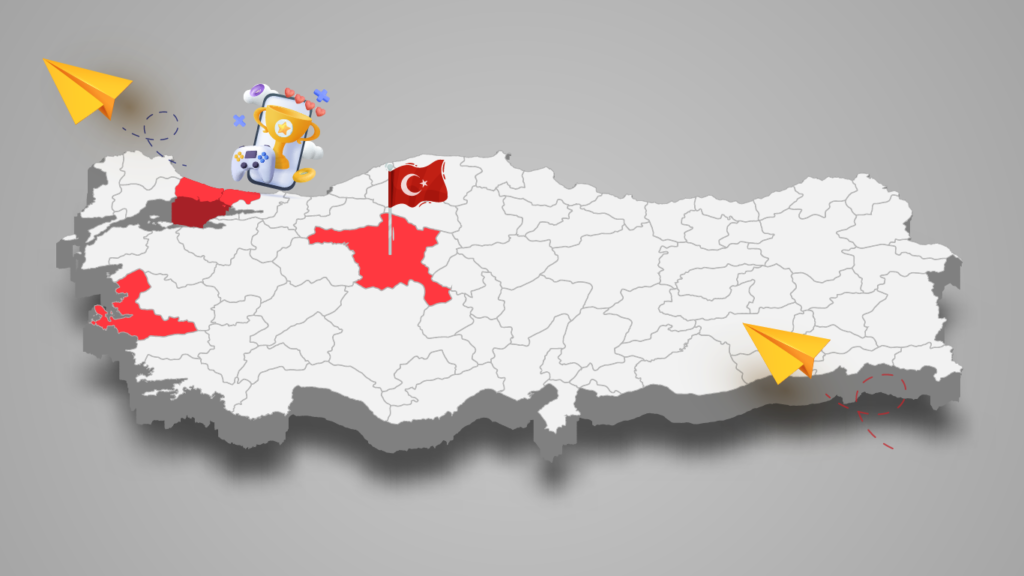

This post aims to provide a comprehensive guide for anyone considering moving to Turkey, especially those in the mobile gaming industry.
By understanding the culture, daily life, work environment, and practical aspects, newcomers can better navigate their new home and enjoy all that Turkey has to offer.
Live or Leave! The headline sounds cool, right?
This shot is the #3 after our last two articles ‘Mobile Gaming World: Türkiye’ & ‘Mobile Games Leaderboard: Top Turkish Studios’.
Today, I want to address the questions from my friends abroad who are curious about visiting or relocating to Turkey, particularly those considering investments in mobile gaming studios.
If you are fortunate enough to choose where to live, I will provide a balanced view of life in Turkey—the highs and the lows—so you can determine if it’s the right fit for you.
Culture & Life as an Immigrant: Turkey Edition
“Why don’t you go back to your country?” the lady in the pink hat asked me at a Parisian restaurant. She was annoyed that I was taking a seat she wanted and speaking English with my Chinese friend instead of French.
I ask myself the same question every day—why don’t I go back?
I miss the smell of the Bosphorus, the crunch of a sesame-covered simit for breakfast, and the way people are always ready to help with heavy luggage or any problem, expecting nothing in return. I miss feeling less alienated, not having to translate every thought in my head, being quick-witted, and funnier in my native language. Yet, each time I fly back to the 15th biggest city in the world, Istanbul, to visit my family and friends, I find myself feeling tense.
There’s always a sense of relief when I’m on the flight back to Paris, surrounded by 50 other people who just had a nose job or hair transplant in Istanbul. Even while dreaming of Karaköy, I catch myself advising people to avoid taxis, not to talk to strangers, and to be extra cautious in public when in Istanbul.
A Japanese friend recently asked me if we consider ourselves Asian in Turkey. I used to think so, but after visiting East Asia, I realized it isn’t that simple.
Just like my complicated relationship with Turkey, the country itself is a blend—a rich mix of European, Asian, Middle Eastern, Slavic, and Arabic cultures. Which influence feels stronger depends entirely on who you ask and where they come from.
Understanding Turkish Work Culture: An Introduction
The Culture Map by Erin Meyer classifies countries on 8 different scales that compare cultures on various dimensions, such as communication style, decision-making, trust-building, and attitudes toward time. This helps understand and navigate how cultural differences impact communication and collaboration in the global workplace.
While looking for the stance of Turkey in it, I came across this analysis of Aysegul Yayla:

Communicating
Turkey is placed more towards the high-context side, similar to Japan and China, indicating that communication in Turkey often relies on implicit messages and non-verbal cues. This suggests that understanding the subtext and context is crucial when interacting with Turkish culture.

Evaluating
Turkey seems to lean slightly towards indirect negative feedback, similar to Japan, indicating that criticism is often delivered subtly or diplomatically. This approach avoids confrontation and aims to maintain harmony in professional and personal relationships.

Persuading
The position of Turkey is closer to the principles-first side, indicating that arguments are generally made based on theoretical principles rather than practical application. This might suggest that Turkish professionals appreciate understanding the reasoning behind decisions or actions before considering their implementation.
Leading
Turkey is positioned more towards the hierarchical end of the spectrum, indicating a preference for clear organizational structures and respect for authority. Decision-making processes may be more centralized, and there is a notable respect for seniority and titles. I will not make any political jokes on this, I enjoy my freedom. 🙂

Deciding
Turkey appears to lean towards a more top-down decision-making style, where decisions are often made by senior leaders or managers rather than through a consensual process. This reflects a cultural preference for strong leadership and directive decision-making. Is this the reason behind machismo and… “political stability” for 20+ years?
Trusting
Turkey is closer to the relationship-based side of the spectrum, which is typical in cultures where trust is built through personal relationships and long-term familiarity rather than immediate, task-based achievements. Building trust may require more time and effort in Turkish culture compared to more task-oriented cultures.

Disagreeing
Turkey tends to avoid confrontation and is positioned towards the avoids confrontation end of the scale, similar to Japan and China. This suggests a preference for maintaining harmony and avoiding open disagreement in both professional and social settings.

Scheduling
Turkey is placed between linear-time and flexible-time but leans more towards flexible-time, indicating a more relaxed approach to time management. This suggests that Turks may prioritize relationships and adaptability over strict adherence to schedules and deadlines.
Work Environment: Mobile Gaming Industry Dynamics
The mobile gaming industry in Turkey is rapidly growing, with a dynamic and competitive work environment. No 4-Day Week here yet, though, don’t be surprised if you hear 60 Hours a week.
While studios like Dream, Peak, Spyke, Rollic pay their employees at European standards or even higher, small game studios still pay the Turkish minimum wage of 17,000 TRY (450€/500$)
There are currently 150 active Job Posts from Turkish Mobile Gaming Studios.
Companies here are known for their innovative approaches and collaborative cultures. As someone who has worked in different countries, I find the Turkish work ethic to be a mix of dedication and flexibility. Networking is essential, and building strong professional relationships can open many doors.
Here you can find a quantitative analysis of the Turkish Gaming Market.
Cost of Living: Housing, Transportation, and Daily Expenses
More expensive than Paris, Berlin, or London? Depends.
The cost of living in Turkey varies depending on the city. Istanbul, being the largest city, is relatively more expensive than other regions. Being the 15th biggest city in the world with 16 million residents, it’s important to get used to traffic and around 2 hours of travel time between your home and work in Istanbul.
The biggest gaming hubs in Turkey are in Istanbul, Ankara, and a little bit of Izmir. Make no rookie mistake: Istanbul is the biggest city, but the capital is Ankara.
Housing costs can range from affordable apartments to luxury condos. Public transportation is efficient and inexpensive, making it easy to navigate the cities. Daily expenses such as groceries, dining out, and entertainment used to be affordable, however as of 2024, I find them quite similar to Paris.
Social Life: Building a Community in Turkey
Building a social life in Turkey is both exciting and rewarding.
Turkish people are warm and welcoming, often going out of their way to help newcomers. Social gatherings revolve around food, tea, and lively conversations. Joining local clubs, attending events, and participating in community activities are great ways to make friends and feel at home.

Daily Life in Turkey: Language, Traditions, and Customs
While questions like “Do you have a metro in Turkey? Do you travel on camels?” might make you think the asker is from a place without internet access, the reality is that despite the presence of modern technology, many people’s mindsets remain deeply rooted in tradition.
Turkish is the primary language, and while English is spoken in many urban areas, learning basic Turkish phrases can greatly enhance your experience.
Daily life in Turkey involves savoring traditional cuisine, drinking 6-7 cups of Turkish tea a day, participating in local festivals (when they’re not banned), and respecting social customs such as removing your shoes before entering someone’s home.
1. Hospitality and Social Etiquette
- Custom: Turks are very hospitable. In business and social settings, it’s common to be offered tea or coffee.
- Work Tip: Accept offers for tea or coffee as a gesture of friendliness and to build rapport. Bringing a small gift, such as sweets, to a host can also strengthen business relationships.
2. Language and Communication
- Custom: Turkish is the primary language, though many urban professionals speak English.
- Work Tip: Learn basic Turkish phrases to show respect and facilitate smoother communication. This can be particularly helpful in building trust with colleagues and clients.
3. Respect for Hierarchy
- Custom: Turkish workplaces often have a hierarchical structure where seniority and titles are respected.
- Work Tip: Show deference to senior colleagues and follow proper channels for decision-making. Address people by their titles and surnames unless invited to do otherwise.
4. Relationship Building
- Custom: Business in Turkey is often relationship-driven. Trust and personal connections are valued.
- Work Tip: Invest time in getting to know your colleagues and clients personally. Building trust through social interactions, such as sharing meals or attending events, is crucial.
5. Meetings and Decision-Making
- Custom: Meetings may involve extensive discussions, but decisions are typically made by senior leaders.
- Work Tip: Be prepared for lengthy discussions and be patient. Offer your input respectfully, but understand that final decisions may come from the top.
6. Time and Punctuality
- Custom: While formal meetings may require punctuality, there is a more relaxed approach to time in social and informal settings.
- Work Tip: Aim to be on time for business meetings, but be flexible with timelines for more casual gatherings. Understand that “on time” might have a broader interpretation.
7. Gift-giving and Business Etiquette
- Custom: Small gifts are appreciated, especially when building new relationships.
- Work Tip: Consider bringing a small, thoughtful gift when visiting a colleague’s home or when starting a new business relationship.
8. Dining Etiquette
- Custom: Meals are an important part of social and business interactions.
- Work Tip: Be open to attending business lunches or dinners. These are often opportunities for relationship building, not just formal meetings.
Pros & Cons: The Immigrant Experience
Living in Turkey as an immigrant comes with its set of pros and cons.
On the positive side, you get to experience a rich culture, delicious cuisine, and a warm community. However, adjusting to the bureaucratic processes and language barriers can be challenging. The recent economic challenges with high inflation make people angrier and increasingly racist.

Practical Tips for Newcomers: Navigating Life in Turkey
For those considering moving to Turkey, here are some practical tips:
- Learn basic Turkish to help with daily interactions. Selam! 💃🏻
- Be prepared for cultural differences and embrace them with an open mind.
- Research and choose your city based on your lifestyle preferences and job opportunities.
- Network with locals and other expatriates to build a supportive community.
- Stay patient and flexible, as adjusting to a new country takes time.
Whether you’re in the mobile gaming industry or exploring other fields, Turkey offers a unique and vibrant experience for immigrants.







